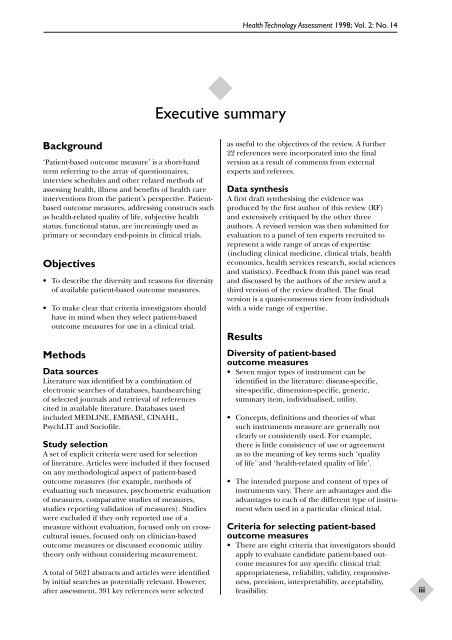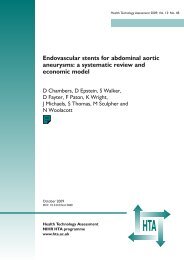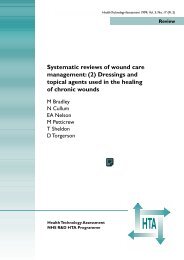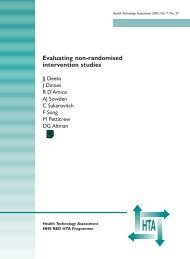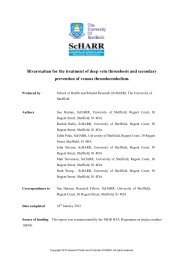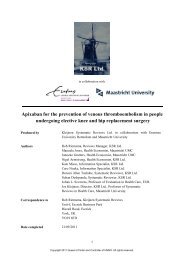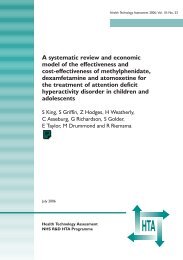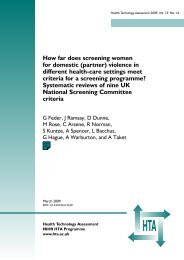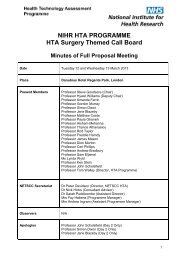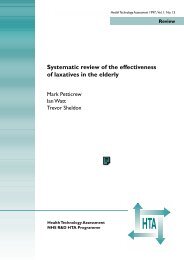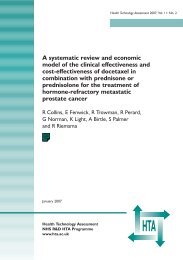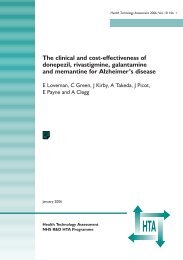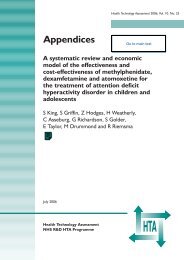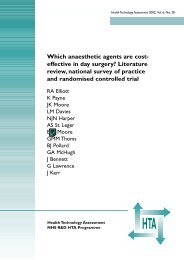Evaluating Patient-Based Outcome Measures - NIHR Health ...
Evaluating Patient-Based Outcome Measures - NIHR Health ...
Evaluating Patient-Based Outcome Measures - NIHR Health ...
Create successful ePaper yourself
Turn your PDF publications into a flip-book with our unique Google optimized e-Paper software.
Background<br />
‘<strong>Patient</strong>-based outcome measure’ is a short-hand<br />
term referring to the array of questionnaires,<br />
interview schedules and other related methods of<br />
assessing health, illness and benefits of health care<br />
interventions from the patient’s perspective. <strong>Patient</strong>based<br />
outcome measures, addressing constructs such<br />
as health-related quality of life, subjective health<br />
status, functional status, are increasingly used as<br />
primary or secondary end-points in clinical trials.<br />
Objectives<br />
• To describe the diversity and reasons for diversity<br />
of available patient-based outcome measures.<br />
• To make clear that criteria investigators should<br />
have in mind when they select patient-based<br />
outcome measures for use in a clinical trial.<br />
Methods<br />
Data sources<br />
Literature was identified by a combination of<br />
electronic searches of databases, handsearching<br />
of selected journals and retrieval of references<br />
cited in available literature. Databases used<br />
included MEDLINE, EMBASE, CINAHL,<br />
PsychLIT and Sociofile.<br />
Study selection<br />
A set of explicit criteria were used for selection<br />
of literature. Articles were included if they focused<br />
on any methodological aspect of patient-based<br />
outcome measures (for example, methods of<br />
evaluating such measures, psychometric evaluation<br />
of measures, comparative studies of measures,<br />
studies reporting validation of measures). Studies<br />
were excluded if they only reported use of a<br />
measure without evaluation, focused only on crosscultural<br />
issues, focused only on clinician-based<br />
outcome measures or discussed economic utility<br />
theory only without considering measurement.<br />
A total of 5621 abstracts and articles were identified<br />
by initial searches as potentially relevant. However,<br />
after assessment, 391 key references were selected<br />
Executive summary<br />
<strong>Health</strong> Technology Assessment 1998; Vol. 2: No. 14<br />
as useful to the objectives of the review. A further<br />
22 references were incorporated into the final<br />
version as a result of comments from external<br />
experts and referees.<br />
Data synthesis<br />
A first draft synthesising the evidence was<br />
produced by the first author of this review (RF)<br />
and extensively critiqued by the other three<br />
authors. A revised version was then submitted for<br />
evaluation to a panel of ten experts recruited to<br />
represent a wide range of areas of expertise<br />
(including clinical medicine, clinical trials, health<br />
economics, health services research, social sciences<br />
and statistics). Feedback from this panel was read<br />
and discussed by the authors of the review and a<br />
third version of the review drafted. The final<br />
version is a quasi-consensus view from individuals<br />
with a wide range of expertise.<br />
Results<br />
Diversity of patient-based<br />
outcome measures<br />
• Seven major types of instrument can be<br />
identified in the literature: disease-specific,<br />
site-specific, dimension-specific, generic,<br />
summary item, individualised, utility.<br />
• Concepts, definitions and theories of what<br />
such instruments measure are generally not<br />
clearly or consistently used. For example,<br />
there is little consistency of use or agreement<br />
as to the meaning of key terms such ‘quality<br />
of life’ and ‘health-related quality of life’.<br />
• The intended purpose and content of types of<br />
instruments vary. There are advantages and disadvantages<br />
to each of the different type of instrument<br />
when used in a particular clinical trial.<br />
Criteria for selecting patient-based<br />
outcome measures<br />
• There are eight criteria that investigators should<br />
apply to evaluate candidate patient-based outcome<br />
measures for any specific clinical trial:<br />
appropriateness, reliability, validity, responsiveness,<br />
precision, interpretability, acceptability,<br />
feasibility.<br />
iii


